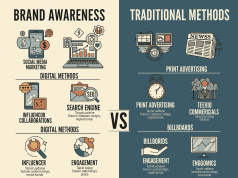As the climate crisis becomes increasingly urgent, businesses are turning to sustainable practices not just as a moral imperative, but also as a key component of their marketing strategies. Eco-friendly marketing is gaining traction, influencing consumer behavior and reshaping brand identities. Here are the top trends in eco-friendly marketing for 2025.
1. Authenticity and Transparency
In 2025, consumers are more skeptical than ever about greenwashing—claims made by companies that their products are environmentally friendly without substantial backing. Authenticity and transparency have become paramount. Brands that openly share their sustainability practices, including supply chain details, carbon footprints, and sourcing materials, are more likely to build trust and loyalty among consumers. This year, companies are investing in certifications and third-party verifications to reinforce their commitments.
2. Circular Economy Focus
The concept of a circular economy—where products are designed for reuse, repair, and recycling—is gaining momentum. Brands are adopting strategies that not only reduce waste but also provide value to customers. In 2025, expect to see more businesses offering product take-back programs, refillable packaging, and incentives for consumers who return or recycle products. This trend emphasizes the importance of sustainability throughout the product lifecycle, creating a holistic approach to eco-friendly marketing.
3. Sustainable Influencer Partnerships
Influencer marketing continues to evolve, with a growing emphasis on partnering with eco-conscious influencers. These individuals not only align with sustainable values but also have dedicated audiences that appreciate and trust their recommendations. Brands are focusing on authentic partnerships with influencers who genuinely advocate for sustainability, leading to more meaningful and effective connections with consumers.
4. Eco-Conscious Content Marketing
Content marketing has a significant role in educating consumers about sustainability topics. In 2025, expect brands to develop rich, informative content that explores their sustainability efforts, provides tips for eco-friendly living, and highlights environmental issues relevant to their target audience. This not only positions brands as thought leaders but also fosters a community around a shared commitment to sustainability.
5. Eco-Friendly Packaging Innovations
Sustainable packaging is no longer just a trend; it’s becoming a requirement for many consumers. In 2025, brands are exploring innovative materials such as biodegradable, compostable, and reusable packaging solutions. This trend not only reduces environmental impact but also enhances the consumer experience, with many brands designing unique, visually appealing packaging that conveys their commitment to sustainability.
6. Local Sourcing and Community Engagement
As consumers become more conscious of their purchasing decisions, the demand for locally sourced products is rising. In 2025, brands are increasingly focusing on community engagement and supporting local economies by sourcing ingredients and materials locally. This not only reduces carbon emissions associated with transportation but also strengthens brand loyalty as consumers appreciate businesses contributing to their communities.
7. Personalized Sustainability Messaging
As consumers seek brands that align with their values, personalized messaging has emerged as a crucial strategy. In 2025, data analytics and AI technology enable brands to segment their audiences and deliver tailored sustainability messages. By understanding individual preferences and behaviors, brands can create targeted campaigns that resonate deeply, promoting sustainable practices while engaging consumers on a personal level.
Conclusion
Embracing sustainability in marketing is no longer optional; it is a critical component of brand strategy in 2025. Companies that authentically engage consumers through transparent practices, innovative solutions, and meaningful partnerships will not only foster loyalty but also play a significant role in the collective effort to build a more sustainable future. By prioritizing eco-friendly marketing trends, businesses can thrive while making a positive impact on the planet.









